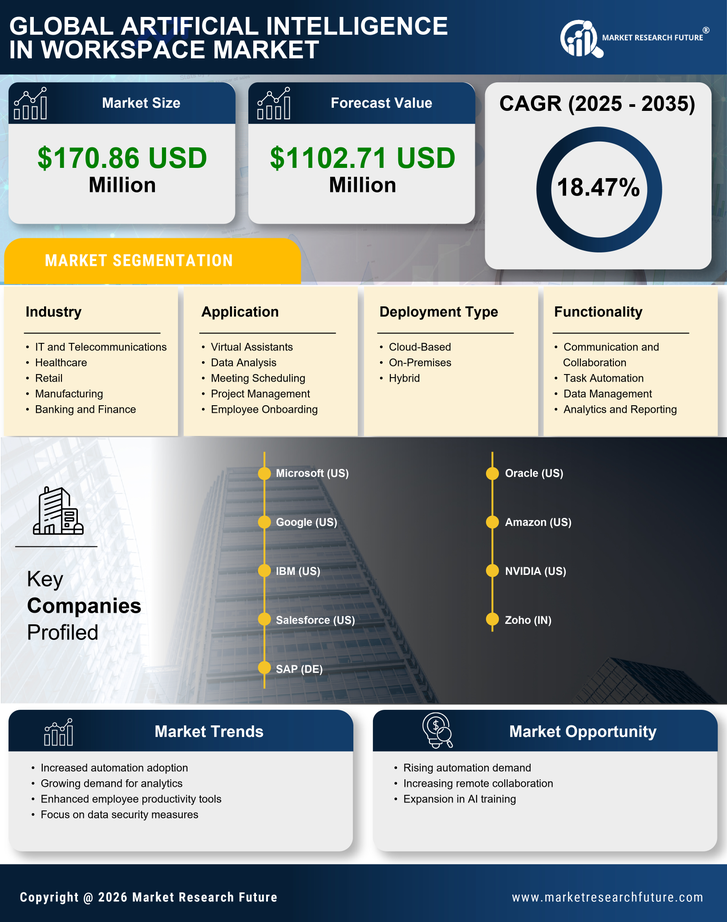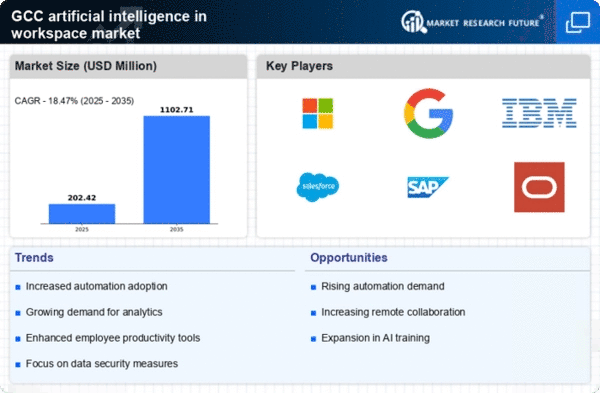The artificial intelligence-in-workspace market is currently characterized by a dynamic competitive landscape, driven by rapid technological advancements and increasing demand for automation and efficiency. Key players such as Microsoft (US), Google (US), and IBM (US) are at the forefront, each adopting distinct strategies to enhance their market positioning. Microsoft (US) focuses on integrating AI capabilities into its existing suite of productivity tools, thereby enhancing user experience and operational efficiency. Google (US), on the other hand, emphasizes cloud-based AI solutions, leveraging its vast data resources to provide tailored services. IBM (US) is concentrating on enterprise solutions, particularly in sectors like healthcare and finance, where AI can significantly optimize workflows. Collectively, these strategies contribute to a competitive environment that is increasingly centered around innovation and customer-centric solutions.
In terms of business tactics, companies are increasingly localizing their operations to better serve regional markets, which appears to be a response to the growing demand for customized solutions. The market structure is moderately fragmented, with several players vying for dominance, yet the influence of major corporations remains substantial. This competitive structure allows for a diverse range of offerings, catering to various business needs while fostering innovation through competition.
In October 2025, Microsoft (US) announced a strategic partnership with a leading regional cloud provider to enhance its AI capabilities in the GCC. This move is likely to bolster its market presence by providing localized solutions that cater to specific regional demands, thereby enhancing customer engagement and satisfaction. Such partnerships are indicative of a broader trend where companies seek to leverage local expertise to drive innovation and growth.
In September 2025, Google (US) launched a new AI-driven analytics tool aimed at small and medium-sized enterprises (SMEs) in the GCC. This initiative is significant as it reflects Google's commitment to democratizing access to advanced AI technologies, enabling SMEs to harness data-driven insights for better decision-making. By targeting this segment, Google (US) not only expands its customer base but also positions itself as a leader in providing accessible AI solutions.
In August 2025, IBM (US) unveiled a new AI platform specifically designed for the healthcare sector, focusing on predictive analytics and patient management. This strategic move underscores IBM's dedication to addressing critical industry challenges through innovative technology. By enhancing operational efficiencies in healthcare, IBM (US) is likely to strengthen its foothold in a sector that is increasingly reliant on AI for improved outcomes.
As of November 2025, the competitive trends in the artificial intelligence-in-workspace market are heavily influenced by digitalization, sustainability, and the integration of AI into everyday business processes. Strategic alliances are becoming increasingly vital, as companies recognize the need to collaborate to enhance their technological capabilities and market reach. Looking ahead, competitive differentiation is expected to evolve, with a pronounced shift from price-based competition to a focus on innovation, technological advancement, and supply chain reliability. This transition suggests that companies that prioritize these elements will likely emerge as leaders in the evolving landscape.

















